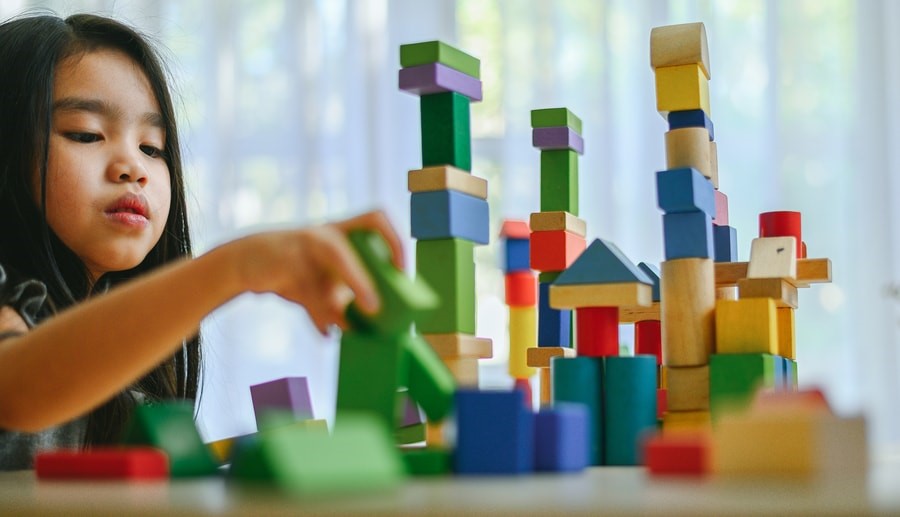- 855.224.8655
- Schedule a Tour

Executive functions refer to the cognitive processes that our brains perform, including paying attention, organizing and planning, initiating tasks and staying focused, regulating emotions, and self-monitoring. Executive functioning allows us to carry out critical, everyday tasks.
The prefrontal cortex, which controls executive functioning, is one of the last parts of the brain to develop. While we’re born with the ability to develop these skills, it takes time and practice to learn executive functions. After all, these are pretty complex tasks, especially for children! The key is to provide a supportive environment to help them develop these skills so they can learn and grow in the classroom and in life.
We partner with Krista Girard, M.Ed, an instructor for Early Childhood professions, on executive functioning. Learn more about the importance of these skills in children’s development, and how you can support their growth.
Executive Functioning and Learning
Executive functioning can impact the ability to focus, prioritize, follow instructions, etc. Early research shows that executive function skills can positively impact early literacy and math skills. When learning new skills, children need to practice those skills, but they also have to practice the executive functioning in order to develop critical thinking.
Girard uses block play as an example to illustrate how important executive functions are to learning. Children need to apply fine motor skills to place the blocks in a structure. They might need to count the blocks or name the colors. Now in applying executive functioning skills to block play, children need to be able to stay self-motivated long enough to apply what they’ve learned and practice.
Activities like block play may rely on emotional regulation. If they are not successful the first time, are they able to try again?
Executive functioning also gives children the ability to plan and organize based on prior experience. Have they built blocks before? What about that experience was fun and exciting? What part didn’t work? Executive functioning helps children change the outcome based on their previous learning experiences.
Executive Functioning Strategies
Executive functions can be taught and improved. Children learn at their own pace, so some children may pick up these skills faster than others.
“Age-appropriate expectation is important when helping a child develop these skills, as well as understanding where the child’s abilities lie,” says Girard. “Teaching a child executive functioning, as well as any other skill, should be fun and encouraging.”
Here are some effective strategies that can help children develop executive functioning.
Try Visual Aids
To practice following directions and completing steps, try including visual aids. For example, if your children use chore charts, make sure there are pictures to accompany each task.
You can also practice visualization to help with their working memory. Rather than you providing images of what to do, ask them to visualize the task. What does a clean room look like? How should we set the table?
Have Your Child Teach You
One of the best ways to learn and retain information is to teach it to someone else. Ask your children to teach you something, like how to play hopscotch, brush your teeth, etc. This is good practice in providing directions to someone else.
Try Cooking or Baking
Baking or cooking requires focus and concentration. In addition, there are steps that must be completed in sequential order. You have to put the ingredients in a bowl before you can mix. This is a fun activity you can do together to enhance executive functioning.
Act It Out
A fun way to practice executive functioning skills is through storytelling. Whether you read a book together or your children make up a story, have them act it out! It’s a great way to apply thoughts and actions to the story’s plot. Children practice working memory, as they have to apply a series of events in order.
Play Follow the Leader
Imitation games like “Follow the Leader” encourage toddlers and preschoolers to practice directions, inhibition, and focus. Children have to imitate the actions of their peers and use their working memory.
Create Consistency at School and Home
For children who have challenges with executive functioning, consistency is key. Strategies that work well in the classroom should be implemented at home. For example, if your child has a visual checklist of things to do at school, you might create a visual checklist for home.
These strategies combined with support from your children’s teachers can help improve executive functions. It’s expected that these skills will take extensive practice before they are fully developed. You’ll need to work on these skills every day, inside the classroom and at home. Importantly, let your children know that trying to apply these skills is often more of a success than mastery, says Girard.
Many executive functioning skills closely align with social-emotional development, including following directions, completing self-help tasks, and regulating emotions.
About Krista Girard: Krista Girard, M.Ed is an instructor for Early Childhood professions. She aims to share her knowledge, skills and experiences to help guide teachers and parents in best practice for children.
